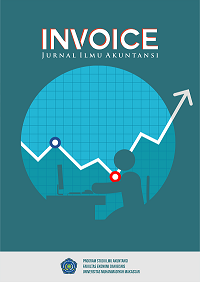Analysis Of Ethics, Sustainability and CSR In The Burger King Company
DOI: https://doi.org/10.26618/inv.v5i2.12311
Abstract
Burger King from its name alone makes you know that this company operates in the culinary sector, which is the point of its name, namely burgers, which are definitely the main menu of its name. Currently, there are many companies and individuals who sell this food, one of which is Burger King. Burger King was first founded in Miami, Florida, America. Currently, Burger King has almost 19,247 branches throughout the world and 31 branches in all cities in Indonesia. Burger King has a variety of very interesting menu variants, not only burgers but also fried chicken, potatoes, and various other menus that are no less delicious than their burgers. Burger King also makes package menus containing potatoes and drinks too, but we as consumers can also buy certain foods that we want. Burger King also often creates special menus that are only released at certain moments or collaborates with other food brands which makes it even more attractive to consumers. In Indonesia itself, Burger King has also included its company in online applications such as Gofood, Grab, and others. Burger King fans are not only adults but all groups, from children to the elderly, love this food.References
Aras, G., & Crowther, D. (2019). Corporate sustainability and responsibility: An introductory review and future directions. International Journal of Corporate Social Responsibility, 4(1), 1-15.
Carroll, A. B. (2016). Carroll's pyramid of corporate social responsibility: A review and future perspective. International Journal of Management Reviews, 18(1), 1-16.
Elkington, J. (2018). 25 years ago I coined the phrase "triple bottom line." Here's why it's time to rethink it. Harvard Business Review, 96(1), 58-67.
Freeman, R. E., Harrison, J. S., Wicks, A. C., Parmar, B. L., & De Colle, S. (2019). Stakeholder theory: The state of the art. Cambridge University Press.
Lencioni, P. (2016). The ideal team player: How to recognize and cultivate the three essential virtues. John Wiley & Sons.
Maon, F., Lindgreen, A., & Swaen, V. (2019). Corporate social responsibility and human resource management: A systematic review and conceptual framework. Human Resource Management Review, 29(4), 436-456.
Mohr, L. A., Webb, D. J., & Harris, K. E. (2019). Do consumers expect companies to be socially responsible? The impact of corporate social responsibility on buying behavior. Journal of Consumer Affairs, 53(1), 1-27.
Ruggie, J. G. (2013). Just business: Multinational corporations and human rights. WW Norton & Company.
Schwartz, M. S. (2017). Corporate social responsibility. Routledge.
Sen, S., & Bhattacharya, C. B. (2018). Doing better at doing good: When, why, and how consumers respond to corporate social initiatives. California Management Review, 60(1), 2-24.
Haynes, K., & Murray, A. (2020). Corporate social responsibility and sustainable development: A systematic review and conceptual analysis. Sustainability, 12(4), 1504.
Aguinis, H., & Glavas, A. (2019). On corporate social responsibility, sensemaking, and the search for meaningfulness through work. Journal of Management, 45(1), 105-131.
Russo, M. V., & Harrison, J. S. (2015). Organizational design and employee behavior in regard to corporate social responsibility: A conceptual model. Journal of Business Ethics, 127(4),
Carroll, A. B. (2016). Carroll’s pyramid of CSR: taking another look. International Journal of Corporate Social Responsibility, 1(1)
Moon, J., & Vogel, D. (2018). Corporate social responsibility, government, and civil society: The case of Europe. Journal of Business Ethics, 150(2), 447-462.
Downloads
Published
Issue
Section
License
Authors who publish with Invoice: Jurnal Ilmu Akuntansi agree to the following terms:
-
Copyright Ownership
The copyright of all articles published in this journal remains with the author(s). However, the authors grant Invoice: Jurnal Ilmu Akuntansi the right of first publication with the work simultaneously licensed under a Creative Commons Attribution 4.0 International License (CC BY 4.0). This license allows others to share, copy, redistribute, adapt, and build upon the work for any purpose, even commercially, as long as proper credit is given to the original author(s) and the source. -
Licensing and Access
Invoice: Jurnal Ilmu Akuntansi provides immediate open access to its content on the principle that making research freely available to the public supports a greater global exchange of knowledge. All published materials are available freely without subscription or payment and can be accessed, downloaded, and reused by any user provided that appropriate attribution is given. -
Permission for Reuse
For uses not covered by the CC BY 4.0 license, such as commercial reprints, translations, or any form of adaptation without clear attribution, users must obtain written permission from the editorial team. Requests for such permissions can be directed to the editorial office at: [invoice@unismuh.ac.id]. -
Plagiarism and Originality
Authors are responsible for the originality of their submissions. All articles are screened for plagiarism using appropriate tools before acceptance. Manuscripts found to contain unoriginal content or infringing materials will be rejected or retracted as per journal policy.















